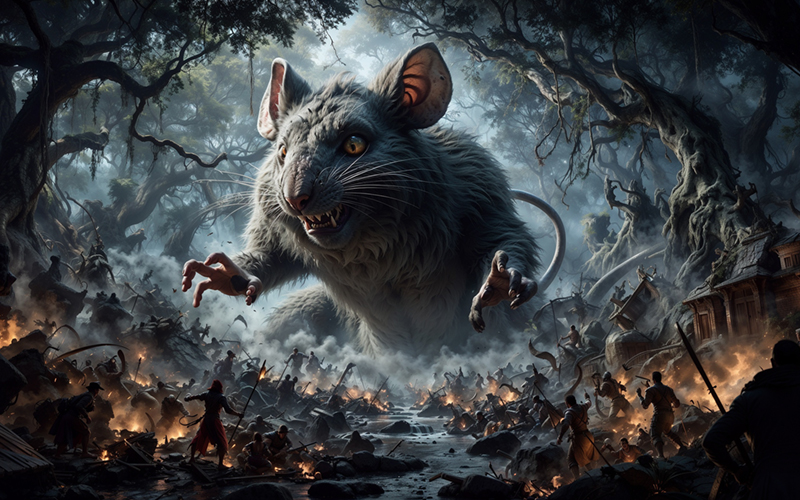Physical Address
Empirical System, 105 First Floor Pitru Krupa, Opp. R.K. Desai College, Koparli Road, Vapi (Gujarat) 396 191
Physical Address
Empirical System, 105 First Floor Pitru Krupa, Opp. R.K. Desai College, Koparli Road, Vapi (Gujarat) 396 191

Long ago, in the divine court of Indra, the king of gods, there lived a celestial musician named Krauncha. He was a Gandharva, known for his mesmerizing music and talents. However, his fame made him arrogant. Krauncha would often boast about his skills and his privileged position in the celestial realms.
One day, as Krauncha performed in Indra’s court, he accidentally stepped on the foot of the great sage Vamadeva. The sage, known for his deep meditation and wisdom, was infuriated by Krauncha’s lack of humility and respect. In his anger, Vamadeva cursed Krauncha to be transformed into a mouse, a creature far removed from his divine status.
Immediately, Krauncha was turned into a gigantic mouse. Stripped of his former glory, he lost control over his senses and began causing havoc everywhere he went. Krauncha, now a monstrous mouse, started gnawing through the sages’ belongings, uprooting plants, and creating chaos in the hermitages of rishis (sages). His destructive nature knew no bounds, and the once-proud Gandharva was now feared and despised.
The sages, unable to tolerate the destruction caused by Krauncha, gathered and prayed to Lord Ganesha. They performed intense austerities and chanted mantras, seeking his divine intervention to save them from the rampaging mouse.
Lord Ganesha, the remover of obstacles, heard the sages’ pleas. With his elephant head and kind eyes, Ganesha appeared before them, ready to help. He assured the sages that he would put an end to their troubles.
Ganesha soon encountered Krauncha, the giant mouse. Using his powerful pasha (noose), Ganesha captured the mouse with ease. Despite Krauncha’s massive size and strength, he was no match for Ganesha’s divine power. The mouse struggled but could not escape from Ganesha’s grip.
Realizing that he was in the presence of a great deity, Krauncha’s arrogance faded away. He remembered his past life as a Gandharva and how his pride had led to his downfall. Filled with regret, Krauncha begged Ganesha for mercy, seeking forgiveness for his misdeeds.
Moved by Krauncha’s sincere repentance, Ganesha decided to show mercy. Instead of punishing Krauncha further, Ganesha offered him a chance for redemption. He chose the mouse to be his vahana, or divine vehicle.
By becoming Ganesha’s vehicle, Krauncha was given a new, sacred role. No longer a destructive force, the mouse now had the honorable purpose of serving the god. Despite his small size compared to Ganesha’s large frame, Krauncha, now named Mushika, became Ganesha’s loyal companion. This act of grace transformed Krauncha’s status from a cursed creature to a divine servant.
In Hindu iconography, Ganesha is often depicted riding on or sitting beside Mushika, symbolizing his mastery over even the smallest and most unruly forces. The story of Mushika is a reminder that every being, no matter how small or fallen, can find redemption and a higher purpose through divine grace.
This story from the Ganesha Purana beautifully illustrates Ganesha’s wisdom, compassion, and his ability to transform even the most negative forces into positive ones, making him one of the most beloved deities in Hindu tradition.